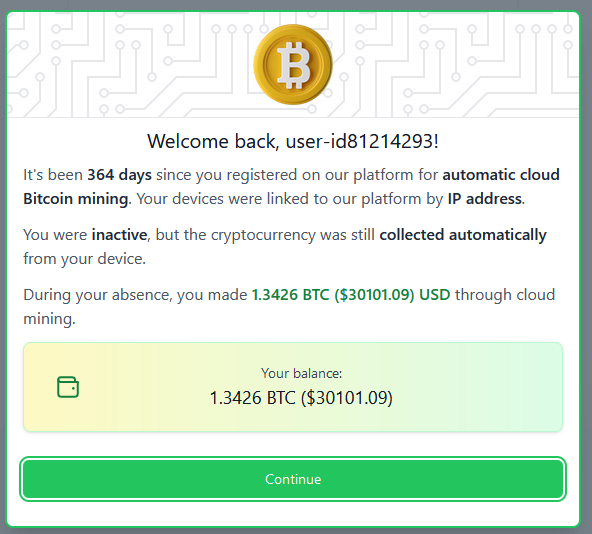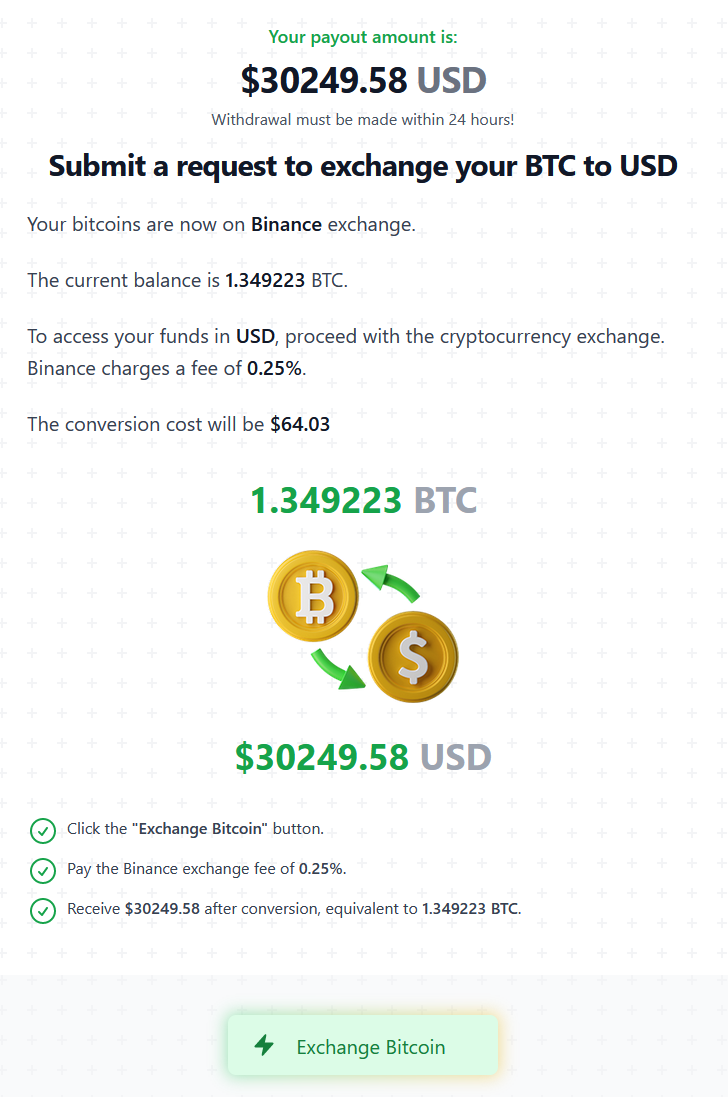Bitcoin bonus payout

Earn on Crypto is available for BTC If you choose to receive your interest in kind (same cryptocurrency), there is no additional bonus payout. How do. crypto payments. A signing bonus paid in crypto could make for an attractive offer. At the same time, flexible payment options like crypto withdrawals might. As an increasing number of people look to invest in digital currencies such as Bitcoin, scams involving Bitcoin bonuses have become. Scammers guarantee that you'll make money or promise big payouts with guaranteed returns. Nobody can make those guarantees. Much less in a short time. Bitcoin bonus payout.
Bitcoin Bonus Scam
Select any trusted exchange, set up an account, and verify your identity to get started. Once you finish registration, add your bank account, as it is the only way to withdraw cash into your account. Next, you transfer Bitcoin to your account on the exchange.Is Bitcoin bonus real? This is a scam! Bitcoin/paypal sent me an email stating that I purchased $729.99 to credit my account. I do not know anything about this. I dont use PayPal or Bitcoin.
How much Bitcoin do you need to cash out? You need to withdraw at least 0.001 bitcoin to make a withdrawal using the Standard withdrawal speed. Rush and Priority withdrawals have a 0.00005 bitcoin minimum withdrawal amount.
How much is Bitcoin withdrawal fee? Bitcoin Withdrawal Fees Cash App users who are subject to income tax in the United States will generally recognize gain or loss if they sell bitcoin on Cash App. Such gain or loss equals the difference between the sales price and the Cash App user's tax basis in the bitcoin that was sold.
How do I get my Bitcoin back from a scammer? What to do if you sent cryptocurrency to a scammer
- Report the fraud to the crypto exchange involved and request a refund. ...
- If the investing app is connected to a debit or credit card, notify the bank or credit card company. ...
- File an identity theft report with the FTC and also report the fraud to ReportFraud.ftc.gov.
Is Bitcoin bonus email legit? TLDR; nobody gives away free money, if it sounds too good to be true - it probably is. Bitcoin Bonus and similar services claiming to give you free money are scams. Do not pay their invoices hoping to receive high rewards.
How to spot a Bitcoin scammer? Signs of crypto scams include poorly written white papers, excessive marketing pushes, and get-rich-quick claims. Federal regulatory agencies, such as the Federal Trade Commission (FTC), and your crypto exchange are the best places to contact if you suspect you've been the victim of a scam.
How do you get payout from Bitcoin? Here are five ways you can cash out your crypto or Bitcoin.
- Use an exchange to sell crypto.
- Use your broker to sell crypto.
- Go with a peer-to-peer trade.
- Cash out at a Bitcoin ATM.
- Trade one crypto for another and then cash out.
- Bottom line.
How do I claim my bitcoin cash? Your digital wallet will allow you to copy your Bitcoin Cash address to your clipboard. Then, you just need to provide the sender with that address via email, messaging app, SMS, etc. Most wallets also provide you with a QR-code version of your Bitcoin Cash address.
How long does Bitcoin payout take? Bitcoin's transaction times can vary greatly, ranging anywhere from ten minutes to one day. However, it will usually take between thirty minutes and two hours to complete the process. It is worth keeping in mind that the average transaction time tends to be around one hour.
What happens if you buy Bitcoin on Cash App? Cash App acts as a bitcoin wallet, where you can view your BTC balance and buy or sell at any time. Cash App securely stores the private keys for your bitcoin, so you can instantly access it at any time.
Can I cash out Bitcoin to my bank account? Through Crypto Exchanges
What happens if I sell Bitcoin on Cash App? Understanding Gains and Cost-Basis
How do I convert Bitcoin to cash on Cash App? To sell bitcoin using your Cash App:
- Tap the Bitcoin tab on your Cash App home screen.
- Press Sell.
- Select an amount or tap … to enter a custom amount.
- Enter your PIN or Touch ID and select Confirm.
How do I withdraw from Bitcoin bonus? To withdraw money from a Bitcoin bonus, follow the platform's standard withdrawal process, usually involving transferring funds to your linked bank account or external wallet. Ensure that you've met any required conditions or terms of the bonus.
Bonus Bitcoin Review
Since nobody gives away free money, if users pay that, their money is gone, and they never receive the promised payout. As a result, many individuals mistakenly believe that BTCPay Server is responsible for processing payments made through the scammer's sites, leading them to seek help in our support channels.
BTCPay Server is a free and open source software project composed of contributors and supporters from all over the world. The team provides a self-hosted software solution that allows anyone to accept Bitcoin payments from their customers without the need of a middleman.
The merchant is running their own BTCPay Server without us - the creators of the software - having any kind of control over their server. It is important to make the differentiation between payment platform providers like PayPal, Stripe and others at this point.
These companies function as a trusted third party between the customer and the merchant and can freeze or hold accounts in case of dispute - BTCPay contributors cannot do that. The scammers use Google Forms to send out mass emails containing a link to their website. These emails can look like the following:.
The processing screen looks like this running a bunch of absolutely random hash values by the user:. We assume this is due to the fact that users finding our support channel leading to their sites are constantly taken down. Whenever a user complains about bitcoin bonus scam sites, we ask for the URL the scam is hosted on. It seems as if the the persons behind this operation, switch the domain used for it constantly.
We do a simple whois query opens new window of the domain and locate the abuse contact from the registrar where the domain was registered. Scammers often impersonate credible authorities, such as government agencies or law enforcement, claiming legal issues or frozen accounts. They exploit these fabricated scenarios to coerce victims into buying cryptocurrency as a supposed solution.
Remember, legitimate entities will never ask for cryptocurrency payments to resolve legal matters. When encountering real scams, the FTC advises that you should report them to the Federal Bureau of Investigation FBI immediately, and not send the thief any money or communicate with them at all.
While the legal framework around Bitcoin remains fluid, understanding your rights and staying vigilant against scams is paramount. Always approach unsolicited offers with skepticism and prioritize safeguarding your digital assets. Staying vigilant against Bitcoin bonus scams is crucial.
Here's a guide to safeguarding yourself, enriched with expert insights and practical tips. Scammers often use phishing tactics, sending unsolicited emails or messages to trick you into revealing personal information. Bitcoin bonus payout Always verify URLs to ensure you're on the legitimate site and avoid clicking on dubious links.
Remember, safeguarding your private key is paramount. For added security, enable two-factor authentication on your crypto wallet or exchange. This simple step can significantly enhance the safety of your funds. Before investing, thoroughly research the cryptocurrency, its founders, and its reputation. Check for registrations with regulatory bodies like the SEC.
As Tim Falk from Finder. Be skeptical of offers that seem overly attractive. As the saying goes, if it seems too good to be true, it probably is. Your private keys are the gateway to your assets. Keep them secure and never share them. Store them offline, away from potential digital breaches.
Cybersecurity expert Adam Levin emphasizes staying informed as the best defense against Bitcoin scams.  Yes, legitimate Bitcoin bonuses exist, typically as promotions by reputable crypto exchanges or wallets, such as Kraken and eToro. However, it's crucial to verify the authenticity of such offers, as scams often masquerade as bonuses. Yes, individuals have received money from legitimate Bitcoin bonuses.
Yes, legitimate Bitcoin bonuses exist, typically as promotions by reputable crypto exchanges or wallets, such as Kraken and eToro. However, it's crucial to verify the authenticity of such offers, as scams often masquerade as bonuses. Yes, individuals have received money from legitimate Bitcoin bonuses.
Always ensure that the source is trustworthy and that the offer aligns with standard industry practices. To withdraw money from a Bitcoin bonus, follow the platform's standard withdrawal process, usually involving transferring funds to your linked bank account or external wallet. Ensure that you've met any required conditions or terms of the bonus.
Bitcoin scammers often promise unrealistic returns, ask for personal information upfront, and use high-pressure tactics. Be wary of poor digital presentation, unsolicited offers, and requests for payment in cryptocurrency. In the crypto space, staying informed and vigilant is crucial.
Bitcoin bonus scams, a growing concern in the digital currency space, exploit the allure of seemingly lucrative offers. Remember, if something sounds too good to be true, it probably is. Always research thoroughly and question the legitimacy of any 'bitcoin bonus' offers you come across. By staying educated and cautious, you can navigate the crypto landscape safely.
Visit Coin for the latest updates and insights on crypto coin prices and trends, helping you make informed decisions in this ever-evolving market. Skip to the Good Stuff. The Deceptive Facade Scammers craft these schemes with a veneer of legitimacy, creating fake websites or social media profiles that mimic reputable companies.
A Brief History Tracing back to the early days of cryptocurrency, when public knowledge was limited, Bitcoin bonus scams have evolved significantly. The Evolution of Scams These scams are a testament to the ever-changing landscape of cryptocurrency fraud. Here are some key warning signs: Red Flag Description Guaranteed High Returns Promises of high returns in a short period, which are unrealistic in the volatile Bitcoin market.
Demands for Personal Information Requiring sensitive personal details like bank or credit card information upfront is a warning sign. Suspiciously Low Fees Extremely low transaction or investment fees, not aligned with market norms, used as a lure. Unprofessional Digital Presence Poorly designed websites or social media profiles lacking professionalism may indicate a scam. Unsolicited Offers Random, unsolicited messages or emails offering Bitcoin bonuses or investments are suspicious.
Pressure Tactics Creating a false sense of urgency, pushing for quick investment decisions. Lack of Transparency Vague or unavailable details about the investment or bonus, as legitimate offers are usually transparent. Inconsistent Communication Inconsistencies or changes in the provided information, indicating potential falsehoods. No Verifiable Credentials Absence of endorsements or credentials from known, reputable sources.
Overly Complex Schemes Complex investment schemes with unclear information, designed to confuse victims. Requests for Cryptocurrency Payments Asking for payments in cryptocurrency for investments or bonuses, due to the difficulty in tracing such transactions. Legal and Consumer Rights in the Face of Bitcoin Bonus Scams Navigating the murky waters of Bitcoin bonus scams requires a keen understanding of both legal perspectives and consumer rights.
Understanding the Legal Landscape Cryptocurrencies, including Bitcoin, operate in a realm where traditional government-backed safeguards don't apply. Identifying Scam Tactics Scammers often impersonate credible authorities, such as government agencies or law enforcement, claiming legal issues or frozen accounts. Never disclose your private key or seed phrase.
Utilize the Bitcoin Scam Test: This tool helps assess the legitimacy of unfamiliar services. Phishing sites mimic legitimate ones to capture your credentials. Robust Password Practices: Create strong, unique passwords for each account. Enable 2F Two-factor authentication adds an extra security layer.